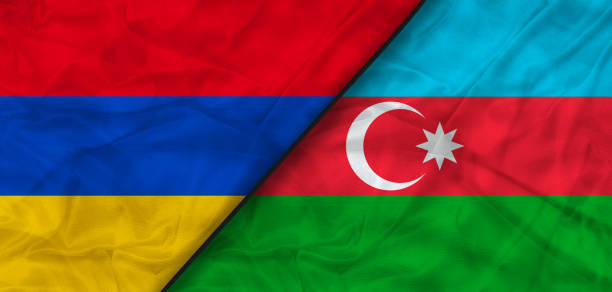Baku’s lightning military operation of September 19-20 has ended three decades of de facto self-governance for Nagorno-Karabakh. The breakaway government announced last week that all government entities would be dissolved by the end of the year. Over a hundred thousand of its inhabitants have already left for Armenia. Without a shadow of a doubt, this is a humanitarian tragedy. Older generations of Turks know this very well since their grandparents have also experienced such tragedies before, during, and after the First World War having to leave their homes in the former territories of the Ottoman Empire, particularly in the Balkans.
The Western media has reported extensively on the plight of the Armenians leaving the area. But it was mentioned only between the lines that Nagorno-Karabakh is within the internationally recognized borders of Azerbaijan, and that Armenia and Azerbaijan fought a war over the region at the end of which, in 1993, Armenia gained control not only of Nagorno-Karabakh but occupied 20 percent of Azerbaijan’s territory resulting in the mass displacement of ethnic Azerbaijanis from the area.
A reasonable amount of bias in reporting is only to be expected but when the narrative reaches the point of almost encouraging the perpetuation of a most self-destructive enmity and hatred between two nations, it becomes the worst investment in the future.
A New York Times article said the following on the Nagorno-Karabakh conflict: “Tens of thousands died fighting for and against it, destroying the careers of two presidents — one Armenian, one Azerbaijani — and tormenting a generation of American, Russian and European diplomats pushing stillborn peace plans. It outlasted six U.S. presidents.” The use of the word “tormenting” is pure exaggeration.
The OSCE Minsk Group was created in 1992 by the Organization for Security and Co-operation in Europe (OSCE), “to encourage a peaceful, negotiated resolution to the conflict between Azerbaijan and Armenia over Nagorno-Karabakh.” Its permanent members are Belarus, Germany, Italy, Sweden, Finland, and Turkey, as well as Armenia and Azerbaijan. On a rotating basis, the OSCE Troika is also a permanent member. However, the Group has been led mostly by a troika of French, Russian, and American diplomats/co-chairs since 1997. All along these three countries had no problem with the status quo and the co-chairs were not “tormented” by the difficulties in achieving an Armenian-Azerbaijani rapprochement. They comfortably followed the instructions given by their capitals. The French co-chair was among them. A brief look at the “OSCE Minsk Group” page on the organization’s website tells it all.
France will now open a consulate in Syunik, becoming the third country after Iran and Russia to establish a permanent diplomatic presence in Armenia’s strategically vital southernmost region.
Last week Foreign Minister Catherine Colonna said, “We are strengthening our defense cooperation with Armenia. We will have a military attaché at the French Embassy in Yerevan and soon we will also open a consulate in the border Syunik region.”
“The fact that Russia has abandoned Armenia and is complicit in Azerbaijan’s military operations makes international diplomatic actions even more necessary,” Colonna added.
Her reference to Russia “abandoning Armenia” is revealing as regards the past intentions and the unity of the co-chairs of the Minsk Group. And neither the sending of some humanitarian aid nor the opening of a consulate in Armenia would whitewash France of its responsibility for the failure to build peace between Armenia and Azerbaijan. The same goes for the other two co-chairs, Russia and the US. Paris would be wise to focus on Africa and let Baku and Yerevan deal with their bilateral problems.
What Baku and Yerevan now need is constructive advice on dealing with the current challenges and moving toward lasting peace, not encouragement for continued conflict. They need to be told to bury the hatchet for good. Because the two countries are and will remain neighbors. The lasting enmity between them has only proved destructive for both. Today, they are almost where they were more than three decades ago after enormous suffering, devastation, and loss of life.
President Aliev has emphasized that Azerbaijan is committed to upholding the rights of Armenian residents in the Karabakh region under Azerbaijan’s national legislation and international commitments and that their rights would be safeguarded, similar to the rights of other ethnic minorities residing in Azerbaijan. He will be expected not only to simply fulfill his promise but to fulfill it most generously. Because when the current exodus to Armenia ends, some residents of Nagorno-Karabakh would stay there like the parents of my paternal grandfather who had no other option than to continue living in the lost Ottoman territories after the first Balkan war in 1912. Those staying behind in Karabakh should not suffer what they suffered during the decades that followed. I take President Aliyev at his word.
Reportedly, Presidents Aliyev and Pashinyan are to meet in Spain on October 5. Despite the legacy of the past and the challenges of the day, they must bear in mind that what their people need is not more conflict but a paradigm shift. They can find a useful example in the transformation of the relations between France and Germany after the Second World War.
As for Türkiye, now that Azerbaijan’s sovereignty over its territory is completely restored, Ankara should earnestly encourage reconciliation and consider opening the land border with Armenia.










